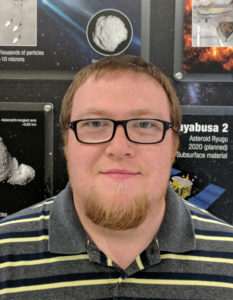
Dr Francis McCubbin (2017 FW Clarke Award) – ECR consistently being overlooked, under-appreciated, and, frankly, taken advantage of.

Dr Francis McCubbin is the 2017 FW Clarke Awardee. Below he shares his thoughts on academic classism and the need for a fundamental culture shift in the treatment of non-Tenured academics, outlines his exciting role as a curator at NASA, and his passion for the Wu-Tang Clan.
This interview focuses on the interviewee, and therefore my own commentary is reduced to an absolute minimum, for now.
Sami: Congratulations on the FW Clarke Award. How did it feel to win this prestigious award?
McCubbin: It was a mixture of elation and humility. I was happy, but you also appreciate the fact that a lot of your peers would have also been worthy recipients.
Sami: How would you describe yourself, professionally?
McCubbin: I am an experimentalist, specifically an experimental petrologist or experimental mineralogist. Fundamentally I am an experimentalist.
Sami: But you’ve also published on natural samples?
McCubbin: Yeah, this is true. But we should consider that experiments are driven by observations, and many of my experimental projects have arisen from observations or discoveries I or others have made when studying samples. Perhaps a modification to my previous answer could be a practical experimentalist.
Sami: What is your current position?
McCubbin: I am the astromaterials curator for NASA.
Sami: This means what?
McCubbin: I am the head curator for all of NASA’s astromaterials collections. This currently includes nine different astromaterials collections including: (1) Apollo samples, (2) Luna samples, (3) Antarctic meteorites, (4) Cosmic dust particles, (5) Microparticle Impact Collection [formerly called Space Exposed Hardware], (6) Genesis solar wind atoms, (7) Stardust comet Wild-2 particles, (8) Stardust interstellar particles, and (9) Hayabusa asteroid Itokawa particles. The Luna and Hayabusa samples were not collected by NASA missions, but NASA curates the portion of sample that was donated to the United States by the former Soviet Union and Japan, respectively.
Sami: You say Astromaterials, and not cosmo. Why? I mean, there’s geochemistry and cosmochemistry at Goldschmidt. But I always think of astrochemistry as a sub-division of astronomy.
McCubbin: The NASA terminology precedes me. I refer to them as astromaterials, extraterrestrial materials, celestial materials, and planetary materials interchangeably.
Sami: Who are you, personally? What are your non-scientific hobbies?
McCubbin: I like to spend a lot of time with my family, and I thoroughly enjoy raising my daughter Elsie. I also enjoy geocaching, coin collecting, cooking, travelling, and gardening. I like to leave work at work and occupy my mind with other things at home. I also listen to a lot of real hip-hop.
Sami: Ok, I’m a Hip-Hop head, so let’s clarify something. I don’t want people to confuse the words Hip-Hop with 50-cent, or similar junk-peddlers. So what do you mean by Hip-Hop?
McCubbin: Yeah, I would add Lil’ Wayne to your list with 50 Cent. Hopefully, the qualifier real cleared that up, but to be specific, when it comes to classic hip-hop, I’m talking Wu-Tang, and for newer stuff, I am talking Akala.
Sami: Where did you work as an Early Career Scientists?
McCubbin: I was an undergrad at Towson Univeristy, near Baltimore, Maryland. At the time, they had a fairly small geology program (4 faculty and 10 majors), which was part of the Department of Physics, Astronomy, and Geosciences. My first experience with research was as an undergraduate, where I worked on a project that focused on the biostratigraphic correlation of middle Devonian rocks (Mahantango Formation) from South-central Pennsylvania to northern West Virginia. I learned two very important things during that project: 1) I absolutely love scientific research and 2) I wanted to work in the field of hard rock geology. After undergrad, I moved to a PhD program at Stony Brook focused on high-temperature experimental petrology. I then moved to the Geophyscial Laboratory as a Carnegie Fellow and worked with Andrew ‘Steelie’ Steele, and collaborated with Bjorn Mysen and Erik Hauri. This was followed by a 50% soft-money Research Scientist position at the Institute of Meteortitics at the University of New Mexico where I worked for 5 years prior to joining NASA.
Sami: What career challenges have you faced? What do you identify as a major challenge to early-career scientists?
McCubbin: I’d say one of the biggest challenges I faced was being a young scientist in a non-tenure track position within a system that places a lot of significance and perceived stature on tenure-track faculty positions.
Sami: What was hard for you, specifically?
McCubbin: First of all, I want to say that I absolutely loved my time in the Institute of Meteoritics (IOM), and everyone within the institute was always supportive; however, the IOM is a research institute that is part of an academic department, and that department was much less supportive of non-tenure track faculty. Many institutions place unreasonable or impossible standards to make a jump between non-tenure track and tenure track positions, and UNM was no exception. In general, I felt like every success I had just didn’t matter because I was branded as a second-class citizen by a number of the tenured and tenure-track faculty. There was also a general sentiment of “you are already here, why would we consider you for a tenure-track position when we could bring in someone new”.
Sami: A sort of, academic Classism?
McCubbin: Exactly. I know that my case is just one of many examples across many institutions all over the world. Excellent scientists in non-tenure track positions are consistently being overlooked, under-appreciated, and, frankly, taken advantage of. There needs to be a fundamental culture shift where we appreciate scientists for their minds and not their academic titles. At present, there are minimal consequences for this kind of behaviour, and I see this as an institutionally normalized form of academic bullying that we need to address and eradicate. I eventually decided to leave UNM and continue my scientific career at NASA. My message to those that are in similar non-tenure track positions and experiencing similar issues: Don’t waste your time and effort trying to convince or change the minds of those that label you a certain way. Stick to your science and keep moving forward until you find an institution that will recognize your worth and appreciate you as an individual.
Sami: Has the EAG or the Geochemical Society played a positive role in your professional development? Or person? Or institution? If so, how?
McCubbin: I would say the single most important and influential aspect of my professional development is being at Carnegie, and being part of the Carnegie Family.
Sami: How so?
McCubbin: Just being around the large number of leaders in our field that are either based at or have come through the lab provides easy access to a wealth of knowledge and know how that cannot be tapped as efficiently in any other way. The exposure to these people and to the alumni network of former Carnegie Fellows all over the world provides a strong scientific (and support) network that one can rely on for the rest of his or her career.
Sami: What benefitted you more, the scientific, or professional development?
McCubbin: Both were excellent, but I would say the professional development benefitted me more. The science was already there because a pre-requisite for a Carnegie Fellowship is a PhD degree and meritorious scientific ideas. But the Carnegie enables people. You learn more about the politics that make science work, you get to refine your science and skills, and you can add news skills if you like. You also gain perspectives on the field of science from angles you may have not considered previously. The seminars are incredible, and there’s 2 a week delivered by high-quality scientists from around the globe. Not to mention, I moved to Carnegie with a really controversial idea of water in minerals from the Moon, and people in the field said I was a fool to pursue the idea. But Steelie just said “that sounds exciting mate, go for it and tell me what I can do to help you.” Being at Carnegie gives you the confidence and freedom to follow the data down controversial paths, with the full-support of the scientific staff. Carnegie is truly a special place to do a postdoc. Furthermore, when I left Carnegie, I felt more empowered and better prepared because I understood how the game works and I knew I would never again be alone on my mission.
Sami: You think they treat postodcs like superstar professors?
McCubbin: Yes, the postdocs at Carnegie are treated as equals and respected as colleagues, and it is so much easier to be productive and successful under such supportive circumstances.
Sami: If you had a time machine and could witness any event, or see any period in geological time, what would you choose to see?
McCubbin: I’d go to the moments before the big-bang. I want to see what was there before, understand what was there before, and then see the whole thing happen.
Sami: Maybe the big bang was a quantum reaction that may not have happened if it wasn’t observed? And what is an observer was required for the big bang? Like a paradoxical loop? A Predestination scenario.
McCubbin: Well, time travel is paradoxical, by definition.
Sami: #micdrop
